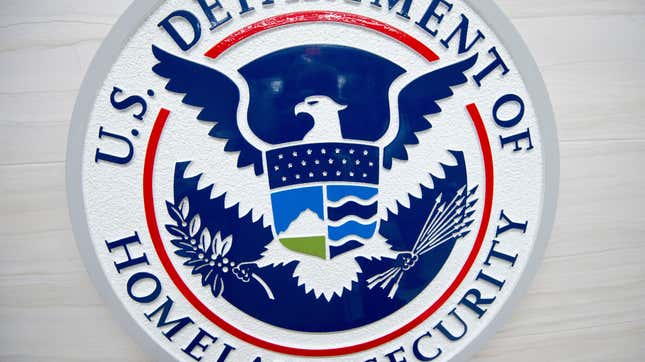
The Department of Homeland Security is being slammed with a new lawsuit after spending just over a year failing to respond to repeated attempts at investigating its long-term data hoovering practices.
The suit was filed last week by the Center for Democracy & Technology (CDT)—a tech policy-centric nonprofit based out of Washington DC—over allegations that two immigration agencies falling under the DHS’s purview failed to respond to three separate FOIA requests the CDT initially filed in 2019. Per the complaint, both the CBP (Customs and Border Protection) and USCIS (United States Citizenship and Immigration Services) went silent on the CDT’s request for records discussing how the two agencies routinely tap into a given social media account both when deciding whether or not to grant a person US citizenship and when deciding the sort of benefits package that person earns once they’re in the country for good.
Two of the CDT’s three filed FOIA’s stemmed from a so-called “Privacy Impact Assessment” on CBP’s social media monitoring initiatives that discussed the sorts of safeguards that agency officials take when handling user data. Specifically, the CDT was looking for records concerning two topics that the DHS alluded to: training material “on the treatment of First Amendment protected activity,” on these platforms, and a document that outlined the “rules of behavior” that current CBP officials are expected to follow. Alongside these FOIA’s, the CDT fired off a third request to the USCIS that broadly asked for certain documents discussing how it uses social media data when “adjudicating immigration benefits.”
On paper at least, when a federal agency receives a FOIA request, it’s required to respond with either a denial or a so-called “grant of access” within the span of 20 business days. As the CDT points out in its suit, even if every requested document can’t be released in this time frame, at the very least the agency should notify which documents are on the table, which are being withheld, and give the party asking for these docs the right to appeal these decisions.
By that rationale, when the CDT filed its initial FOIA request in mid-August 2019, it should have heard a response sometime in mid-September. Instead, it alleges that it hasn’t gotten a substantial request to date. Even USCIS—the only agency to offer any sort of timeline for wrangling these requested documents—initially estimated it would take until the end of December. In the 13 months since its self-set deadline, the CDT alleges the agency hasn’t returned any of the records requested.
“The public deserves to know how the government scrutinizes social media data when deciding who can enter or stay in the country,” said CDT General Counsel Avery Gardiner in a statement. “Government surveillance has necessary limits, particularly constitutional ones.”
The traditional limits the CDT referred to earlier were tested under the Trump administration’s objectively brutal policies regarding immigration. In 2019, we saw the DHS expand the current policies strong-arming nearly all visa applicants into forking over their social media histories, it required the same from those applying for immigration benefits as well as people merely hoping to attend university on US soil.
We’ve also seen these people get turned away at the border as a result. In one notable case, an incoming Harvard freshman, Ismail B. Ajjawi, spent eight hours being detained by US officials in a Boston airport before his student visa was revoked, and he was subsequently put on a plane back home to Lebanon. Per Ajjawi, the only reason for his speedy deportation was because a few of his social media buddies had posted what the officials called “political points of view that oppose the US.” (Don’t worry, he managed to get back onto Harvard’s campus roughly a month later).
This is on top of the vast quantities of data that these officials already have at their fingertips. They can track people’s location, for example, by using cell-site simulators or simply contracting to private partners to do the dirty work for them. If they want to sift through the files on your laptop or phone, you can be detained indefinitely unless you unlock those devices.
It’s not clear whether Biden intends to curb some of these official’s free reign as part of his tenure, but we do know his administration has made immigration reform one of the core tenents of his introduction to the oval office. The CDT’s policy council, Mana Azarmi, stated that the group is “willing to work” with the current administration on getting these documents handed over without too much of a headache.
But as she rightfully pointed out, they’ve already been waiting for more than a year, and the CDT won’t wait around “forever, “especially when constitutional rights are at stake.”
We’ve reached out to the DHS, CBP, and USCIS for comment on the case, and will update this piece if we hear back.